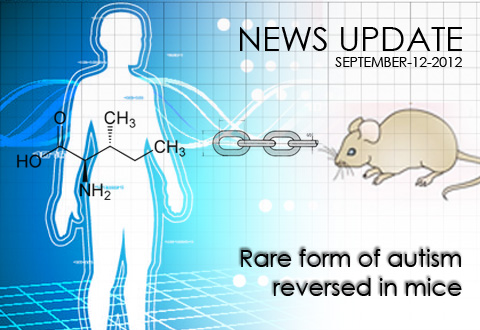Check out other stories from the Latest News
Rare Form of Autism Reversed in Mice
By Mark N. Ziats on September 11, 2012

Background:
Many rare forms of autism result from specific variations in a patient’s DNA. The ability to sequence long stretches of DNA has dramatically improved over recent years. Researchers can now use DNA sequencing to read the genetic code of families affected with Autism Spectrum Disorder (ASD) to find mutations that may predispose children to the disease.
What’s New:
In the 6 September 2012 online edition of Science, researchers report a new genetic mutation linked to ASD in a gene that controls the metabolism of branched chain amino acids (BCAAs, a popular supplement among athletes!). Amino acids are important molecules that affect many functions in the body including brain activity. The researchers found lower levels of plasma BCAAs in individuals who carry the mutation in both copies of their chromosomes. Reasoning that amino acids are important for communication within the brain, the authors tested an amino acid supplementation diet in a mouse model that lacked the gene identified in the ASD individuals. The researchers report that neurological symptoms were reversed in the mice put on the diet.
Why it’s important:
While cases of autism caused by this specific mutation are likely to be extremely rare, this research provides some of the first evidence that the symptoms of autism are potentially reversible after their onset. This incredible finding is likely to spur further research into treatments that may improve autism symptoms in humans.
Help me understand :
| Source(s) : |
| Tweet |

